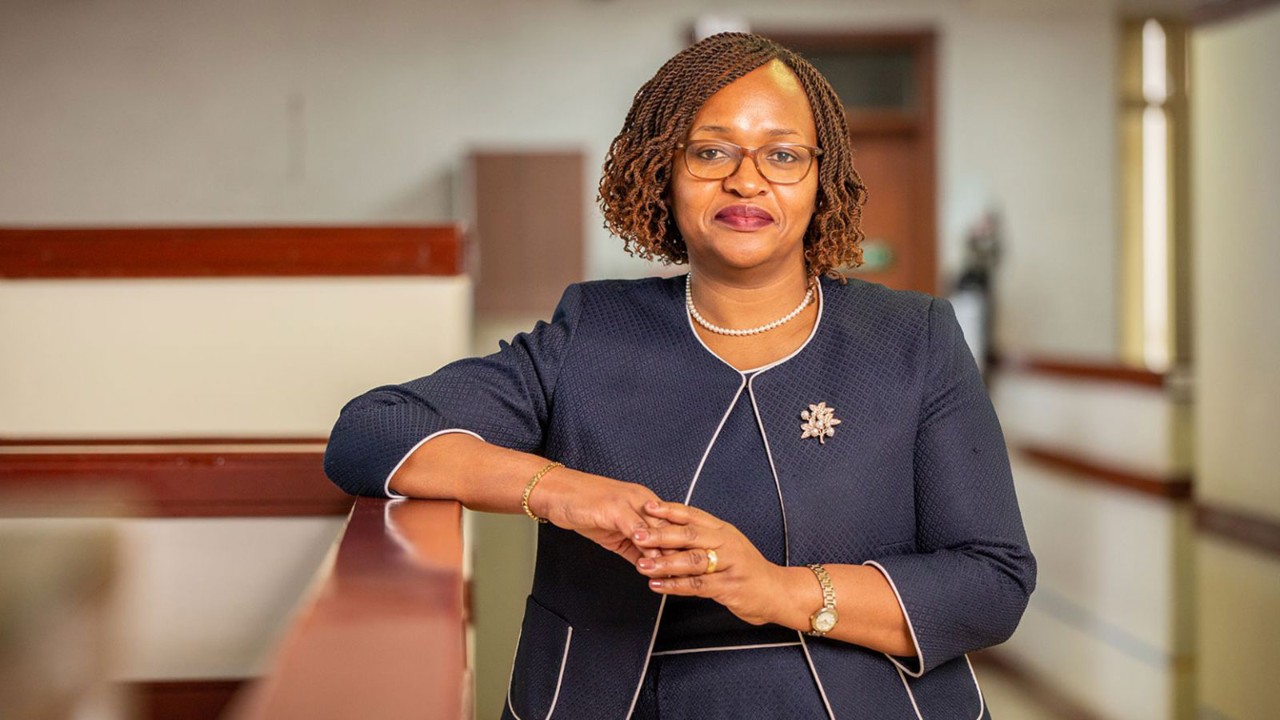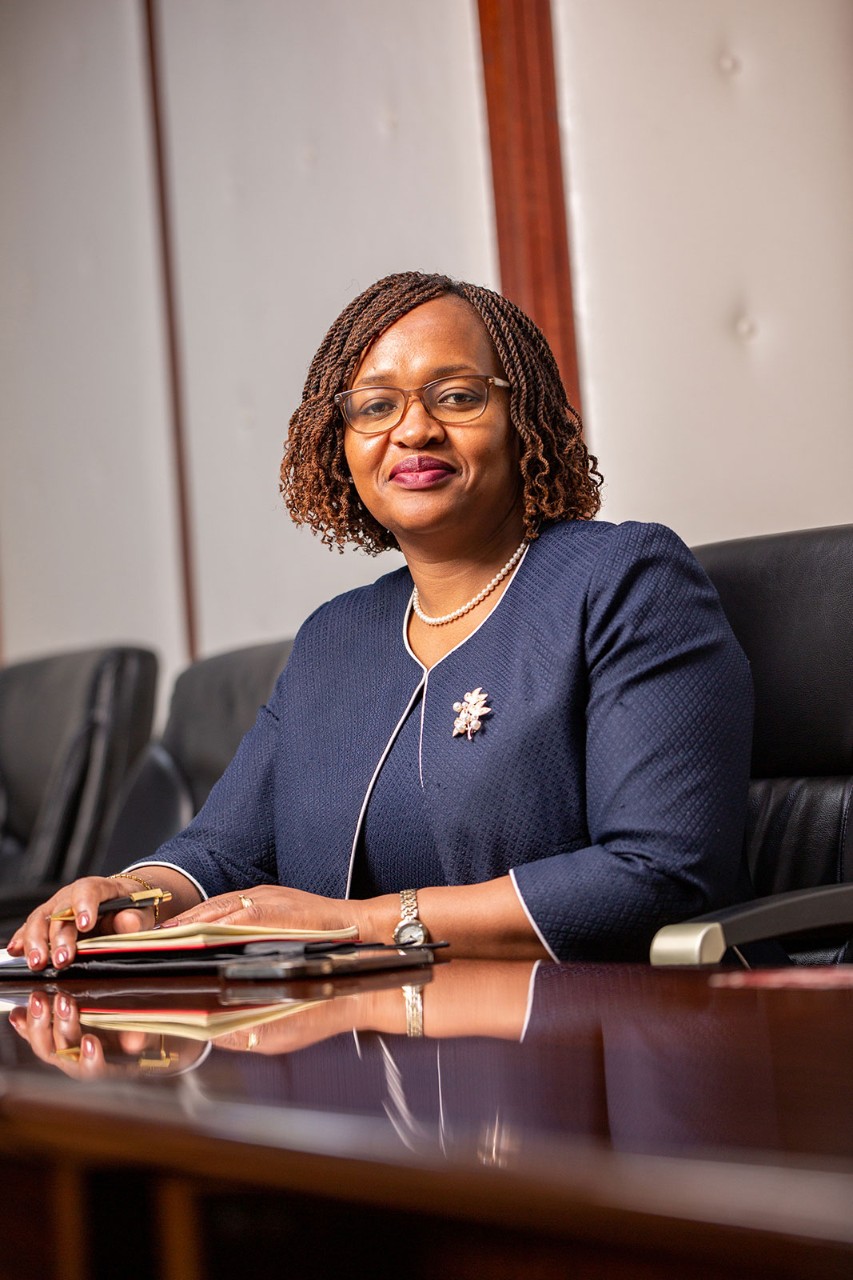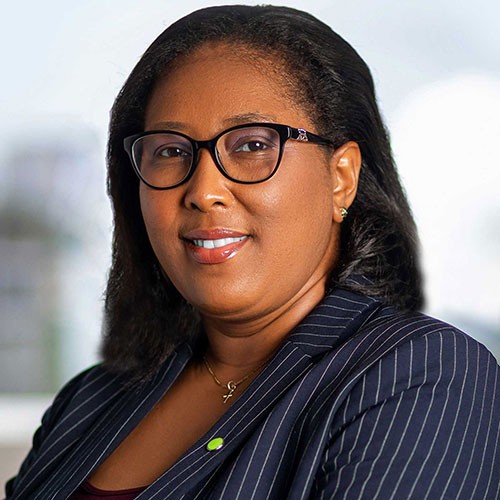
Every time Rispah Simiyu FCCA walks into her 19th-floor office in Kenya’s capital Nairobi, the enormity of the task before her is palpable. The presidential portrait hanging behind her chair and the Kenyan flag mounted on her desk are constant reminders of her duty to spearhead the country’s revenue mobilisation efforts on the domestic front.
As the commissioner for domestic taxes at the Kenya Revenue Authority (KRA), she is responsible for the collection of 65% of the country’s tax revenues. ‘It’s a huge but exciting and honourable responsibility – I really love what I do,’ she says.
Although meeting the country’s ever-growing tax collection targets is in itself an arduous undertaking, it’s the broader context in which the nation operates that presents the real challenge.
‘The reality of the load you carry can cause you to lose sleep sometimes’
After a decade of heavy borrowing to fund infrastructure expansion, the ratio of public debt to GDP in Kenya increased from 44% in 2013 to around 73% in 2023. This surpasses the International Monetary Fund’s recommended threshold of 50% for developing countries. As a result, debt service obligations now take up more than 60% of the nation’s tax income, and the country is turning back to the tax authority to ramp up revenue collection.
‘It’s not an easy job,’ admits Simiyu. ‘The reality of the load you carry can cause you to lose sleep sometimes, but you need to stay focused and keep pushing – you cannot afford to go back to the team you lead and say it cannot be done because the buck stops with us. We have to deliver.’
CV
2020
Commissioner for domestic taxes, Kenya Revenue Authority (including a six-month interim as acting commissioner general in 2023)
2018
Deputy commissioner, tax dispute resolution, KRA
2011
Regional tax manager, East Africa, Standard Chartered Bank
2001
Tax consultant, then tax manager, PwC Kenya
Tax as enabler
The Kenyan government is aiming to increase the ratio of tax revenue to GDP from 15.1% in the last financial year to 25% by 2030. But many Kenyans already feel overburdened by existing taxes. In 2023, a raft of tax hikes by the Kenyan government, which included a doubling of VAT on fuel and the introduction of a levy to finance affordable housing, sparked heavy opposition and street protests.
‘We have managed to onboard more taxpayers from the informal sector’

‘Naturally, taxpayers want good roads, houses, education and better lighting on the streets,’ says Simiyu. ‘So there’s a big demand for the little resources we have. We are working on tax base expansion so that more people share the tax load, thus easing the burden on the existing base.’
Tech support
Simiyu says technology has been a valuable ally in her work, and cites the rollout of the electronic Tax Invoice Management System (eTIMS) two years ago as one of her recent accomplishments. Initially targeted at VAT-registered businesses, the web-based solution (which allows businesses to transmit electronic invoices to KRA in real-time) has resulted in increased accuracy and compliance and is now being rolled out for all businesses, whether VAT-registered or not.
‘Through interventions such as eTIMS we have managed to onboard more taxpayers from the informal sector,’ Simiyu reports.
Revenue collection has also been boosted by bringing digital businesses into the tax bracket. ‘There were initial concerns that the move would discourage businesses in the digital space, but these have now dissipated,’ she says.
‘We have historically relied on traditional brick and mortar businesses as sources of revenue, but the economy has changed, with more and more of it moving into the digital space. It took the Covid-19 pandemic to make us realise that many people were generating revenue in the digital space, and some of them were not paying taxes. That is why we must keep reinventing ourselves.’
Legal dreams
Until her last year at university, where she studied law, Simiyu had never imagined a life outside the courtroom and had contemplated becoming a judge. But a visit to the university from PwC’s recruitment team to interact with students would alter the course of her destiny. ‘Initially, I thought I was joining the firm for just two or three years, but along the way I found my second love, accountancy.’
With support from PwC, Simiyu embarked on a journey to pursue the ACCA qualification, juggling work and studies, and eventually qualified while on a secondment from PwC Kenya in Uganda.
‘ACCA was a game-changer for me. It opened doors and placed me on platforms where I could speak with authority on numbers,’ she says.
‘I had to simply dive in and swim with the sharks’
High rise
After nearly a decade at PwC, she moved to Standard Chartered Bank Kenya and then on to KRA in 2018, becoming commissioner for domestic taxes two years later. Then in 2023, following the resignation of the then commissioner general, she was asked to step up as acting commissioner general – the first woman to hold the position. The appointment came as a surprise and was, she says, a defining moment in her career.
‘There was no time for induction, handover, or anything,’ she says. ‘I had to simply dive in and swim with the sharks.’
Driven by a strong desire to ‘always get things done and deliver on the assignment at hand’, she steered the revenue authority for six months before resuming her role overseeing domestic taxes.
Now in her mid 40s, the mother of four hopes to continue influencing policy on the local and global stages in the long term and, more importantly, helping pave the path for other women in the corporate world.
‘People measure success differently. I will measure mine by how I raise my family’
‘As a young woman professional, I was lucky and blessed to have people around me who believed in my capabilities and integrity. Therefore, my biggest goal is to pay that forward by holding someone else’s hand,’ she says. ‘Women have to find their space in businesses and boardrooms and keep reminding ourselves that we are rightfully there.’
Despite her rich résumé and trailblazing career, she chooses to measure her success in a less public way – through her family. ‘My family is my most prized possession. My life literally revolves around them,’ she says. ‘People measure success differently. At the end of it all, I will measure mine by how I raise my family.’



